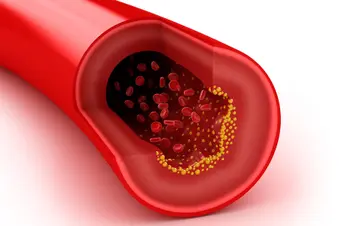Quiz: Test Your Cholesterol Smarts


Question 1/15
What is the main dietary cause of high blood cholesterol?
- Too much cholesterol
- Too much saturated fat
- Too much trans fat
Question 2/15
Which is highest in saturated fat?
- Six large eggs
- 60 large boiled shrimp
- 250 almonds
- Three slices of cheddar cheese
Question 3/15
High cholesterol is mostly a man's problem.
- True
- False
Question 4/15
What is the main symptom of high cholesterol?
- Fatigue
- Weakness
- Weight gain
- None of the above
Question 5/15
At what age should you start having your cholesterol levels tested?
- 20 years old
- 30 years old
- 40 years old
- 50 years old
Question 6/15
Your body needs cholesterol.
- True
- False
Question 7/15
The higher your HDL cholesterol, the greater your risk of heart disease.
- True
- False
Question 8/15
LDL cholesterol is called "bad" cholesterol because too much in your blood can lead to:
- Obesity
- Diabetes
- Atherosclerosis
- All of the above
Question 9/15
Eating oatmeal can lower your bad cholesterol.
- True
- False
Question 10/15
Which is highest in cholesterol?
- A slice of chocolate cream pie
- Two slices of cheddar cheese
- A whole stick of butter
- Two large scrambled eggs
Question 11/15
If you have high cholesterol, you should avoid all fats.
- True
- False
Question 12/15
Which can help lower your "bad" cholesterol?
- Exercise
- A low-salt diet
- A high-protein diet
- All of the above
Question 13/15
What is a good total cholesterol level?
- Below 300 mg/dL
- Below 200 mg/dL
- Below 150 mg/dL
- Below 100 mg/dL
Question 14/15
How do the drugs known as statins improve your cholesterol?
- They raise good cholesterol.
- They slow the making of bad cholesterol.
- They remove bad cholesterol already in your blood.
- All of the above
Question 15/15
Most people can lower high cholesterol if they lose weight, eat better and exercise more.
- True
- False